Reservation software has become a must-have for eateries of all sizes.
TableAgent is a free reservation software provider that has garnered the attention of thousands of restaurants worldwide.
TableAgent's mission is to provide an easy and economical reservation system. It offers a basic booking widget that restaurants can integrate seamlessly into their websites.
This widget allows them to control the display of table availability without redirecting customers to another site for booking. It also provides tools for managing waitlists, accommodating walk-ins, and generating cover reports.
One distinctive aspect of TableAgent is its reservation management approach, which utilizes a "list" system rather than more comprehensive systems that rely on floor plans or calendars.
This can be a simpler and more efficient way to manage reservations for smaller restaurants, but it may not be as effective for larger or more complex operations.
While TableAgent offers an appealing solution for budget-conscious restaurants, it's important to weigh its benefits against potential limitations.
For example, TableAgent does not offer all of the features of more expensive reservation systems, such as online payments, messaging, and table management tools.
Additionally, some users have reported that TableAgent's customer support can be slow or unresponsive.
Overall, TableAgent is a viable option for restaurants that are looking for a free and easy-to-use reservation system. However, it's important to be aware of its limitations before making a decision.
%20(1).webp?width=580&height=529&name=table-limits%20(1)%20(1).webp)
Why restaurants seek alternatives
Here are some reasons why some restaurant owners and managers might want to explore alternative reservation software solutions:
- They need more advanced features, such as online payments, messaging, and table management tools.
- They have a large or complex operation that requires a more robust reservation system.
- They need better customer support.
- They are willing to pay for a more comprehensive solution.
If you are considering TableAgent, it's important to carefully evaluate your needs and requirements to determine if it is the right solution for your restaurant.
Let's take a more detailed look at the features, pricing, pros and cons:
Products
TableAgent offers a free reservation system for restaurants, with the option to pay for additional features such as payments and messaging.
Core Features
- Real-time booking widget
- Reservation, walk-in, and waitlist management
- Reservation reports
Additional Features
- Confirmation messages ($1 per transaction or $29/month for unlimited)
- Ticketing ($20/month)
Pricing
The TableAgent system is free to use, but there are additional charges for payments, messaging, and unlisting from the TableAgent consumer website.
Advantages
- Free to use with the standard plan
- A simple way to start taking reservations from your website
- Competitively priced paid features
- Runs in your web browser
Disadvantages
- Slow updates and new feature releases
- Limited features, with no table management, guest data, or marketing functions
- Non-customizable widget
- List-based system lacks functionality
- No access to reservation networks like Reserve with Google or Instagram
- No support for native iOS or Android apps
Overall
TableAgent is a good option for restaurants that are looking for a free and easy-to-use reservation system. However, it's important to be aware of its limitations before making a decision.
If you need more advanced features, such as online payments, messaging, and table management tools, you may want to consider a different reservation system.
My own thoughts on TableAgent
TableAgent is a good option for budget-conscious restaurants that are just starting out or that have a low volume of reservations. However, if you have a larger or more complex operation, or if you need more advanced features, you may want to consider a different reservation system.
Here are some alternative reservation systems to consider:
- Eat App
- OpenTable
- Resy
- Tock
- SevenRooms
- ResDiary
- Tableo
- Quandoo
These systems offer a wider range of features, such as online payments, table management, and guest data management.
They also have better customer support and integrations with other restaurant software. However, they are also more expensive than TableAgent.
Eat App
Eat App is a guest data platform that ties into a full-featured table management and reservation system.
It helps restaurants leverage everything at their disposal to grow their business, whether that be through generating demand, increasing customer loyalty and retention, or optimizing operations.
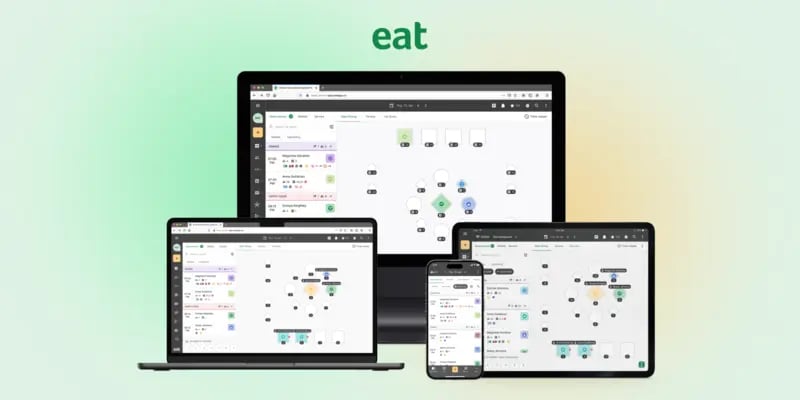
Eat App offers a variety of features, including:
- A powerful CRM with marketing automation
- Full integration with existing software like POS, phone, booking channels, payment processing, and PMS
- A fast and easy-to-use UI
- Commission-free online reservations
- Ownership of customer data
- FB, IG, and Google integrations
- Reservation management
- Table management
- Review management
- Pay-at-table, Waitlist QR codes
- Pre-payments and deposits
- Guest CRM
- Analytics and reports
- Customizable messaging
- Marketing automation
- Operations automation
- Live chat support
- Affordable pricing (starting at $0 per month)
Eat App is a great alternative to TableAgent for most restaurants. It offers a wide range of features at a competitive price. It is also easy to use and integrates seamlessly with existing software.
Cost
- $0 for 50 covers per month
- $69 per month for 500 covers per month
- $139 for unlimited covers per month
- $239 per month for full-stack guest experience tools
- Enterprise plans are also available
>>> View the complete pricing page here.
Ease of use: 5/5
Functionality: 5/5
Support options
- Live in-app support chat
- Onboarding specialist email support
- Knowledge base
- Account managers for higher tiers
Platform operability
- Native iPad, iPhone, Android apps
- Full web app
Free trial: 14-day free trial, free tier also available.
Key features
- Powerful CRM with marketing automation lets you build marketing campaigns directly tied to your customer data. Easily run guest retention campaigns from your reservation system.
- Fully integrated with existing software like point of sale (POS), phone, booking channels, payment processing, and PMS integrations for enterprise clients.
- The fastest way to manage bookings. The Eat App system is designed to speed up all front-of-house workflow, including staff management, managing on-the-go with mobile devices, and waitlist management. The UI is fast and easy to use.
Overall
Eat App is a comprehensive restaurant management platform that offers a wide range of features at a competitive price.
It is a good alternative to TableAgent, especially for restaurants that want to own their customer data and have access to marketing automation and operations automation tools.
OpenTable
OpenTable is a consumer reservation platform (opentable.com) and a table management system for restaurants. The two systems synchronize to provide a central booking management system.
OpenTable's main value proposition is that it provides restaurants with a marketing channel to attract new customers through its diner network. However, OpenTable charges restaurants a high per-cover fee for access to its network, which has been controversial.
One of OpenTable's main strategies for attracting diners is to purchase Google AdWords ads for keywords related to individual restaurants. This allows OpenTable to intercept customers who are already looking for a specific restaurant.
While this strategy is legal, some critics argue that it is unethical because OpenTable is essentially stealing customers from restaurants that are already paying for their own advertising.
Additionally, some restaurants have complained that when OpenTable provides the booking, the restaurant does not have the opportunity to establish a long-term relationship with the customer, even though the customer was already looking for the restaurant online.
On the table management software side, OpenTable was an established player in the US market with few competitors. This lack of competition led to slow innovation.
In recent years, however, competitors have emerged with better, faster, and more portable table management systems. As a result, OpenTable has been forced to play catch-up in terms of releasing new features.
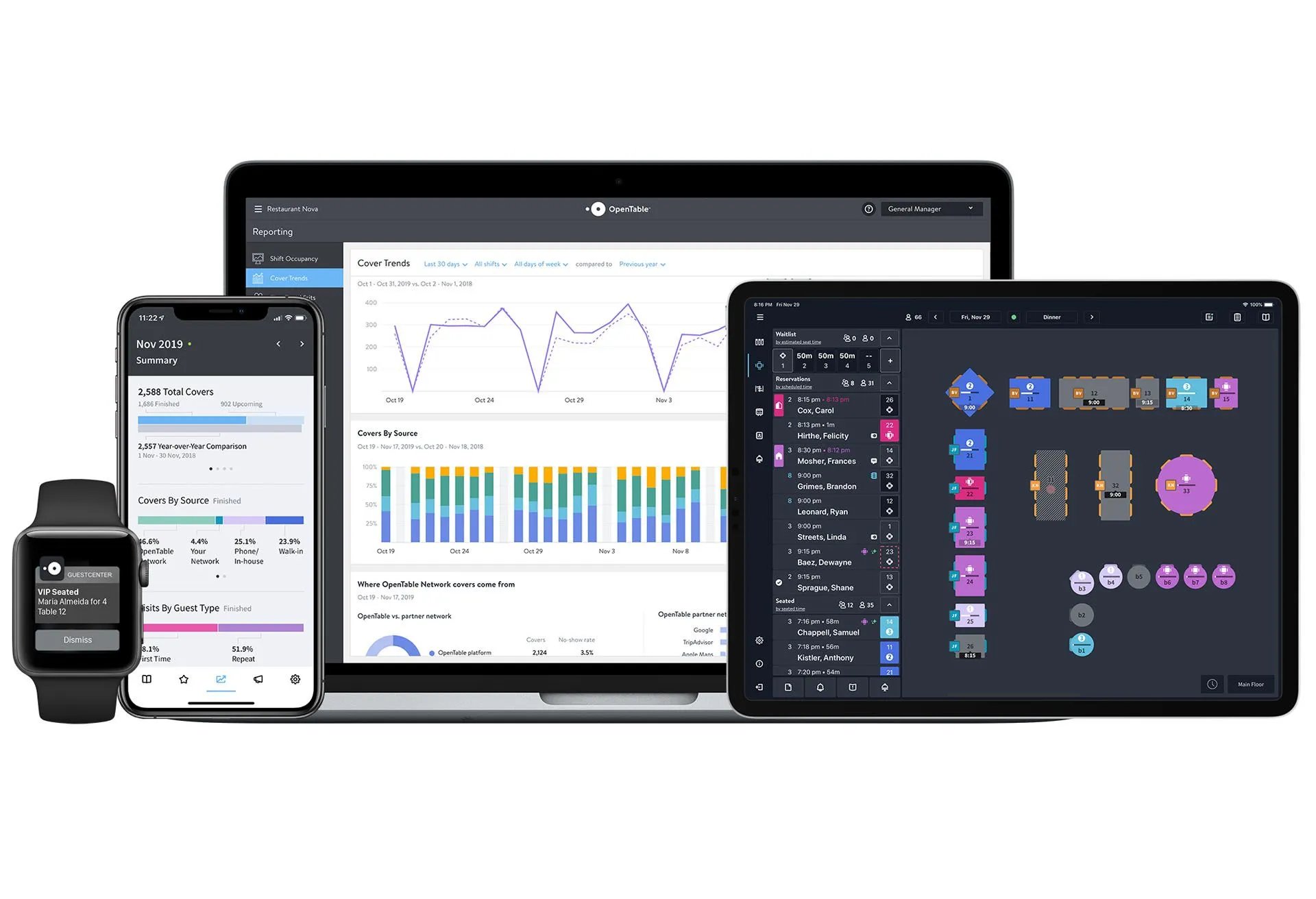
OpenTable pivoting to an advertising network
OpenTable is moving towards a more ad-focused restaurant aggregator model, similar to Booking.com for restaurants.
Restaurants can buy promoted positions in listings and pay for higher positions in the lists of featured restaurants. This will allow restaurants with deep pockets to gain the most visibility on OpenTable.com.
OpenTable's table management and reservation solutions are available through a three-tiered product starting from a basic package to a full-stack table management system.
OpenTable charges a $1-1.5 per cover fee for bookings made through their network and $0.25 per cover fee for bookings made through the restaurant's widget.
Advantages of OpenTable
- Increased exposure through opentable.com, with access to a large pool of diners.
- Helpful reservation and guest management feature for staying organized and managing guests.
- Diner loyalty system you can leverage as a marketing channel.
Disadvantages of OpenTable
- OpenTable's per-cover charges can quickly mount up.
- Competitors restaurants have an easy way of advertising against your restaurant.
- The potential issue with OpenTable using Google Adwords to take organic clicks away from restaurants.
-
When you use OpenTable, you do not own the customer relationship. This means that OpenTable has control over the customer data and can use it to drive more engagement for themselves. This is a disadvantage for restaurants because it makes it difficult for them to build a private customer database and grow their business.
- There's high competition on their consumer-facing app due to the sheer volume of restaurants listed.
Resy
Resy is a table management and restaurant reservation system that is popular in New York and other cities on the East Coast.
It offers a consumer-facing reservation platform, as well as restaurant software that connects to resy.com to manage bookings.
%20(1).webp?width=580&height=397&name=resy%20software%20(1)%20(1).webp)
Features for restaurants
Resy offers a variety of features for restaurants, including:
- Reservation and table management system
- Waitlist management
- AMEX partnerships and POS integration
- Marketing and communication features
- Customizable floor plan
- Restaurant analytics and reporting
- Takeout and contactless dining support
- Guest surveys
- Capacity management
- Mobile Waitlist
- Ticketed events and experiences
Pricing
Resy offers three pricing tiers for restaurants:
- Platform: $249/month
- Platform 360: $399/month
- Full Stack: $899/month
Extra Charges
Resy offers a variety of optional add-on features that come with a fee, such as their ticketing feature for events and POS integration.
Advantages of Resy
- Flat monthly pricing options
- Powerful features in addition to reservation and table management software
- Two-way SMS between restaurants and guests
- Claimed no-show rate of 3% when using the system
Disadvantages of Resy
- Can be expensive, especially if restaurants use all of the optional add-on features
- The diner network is small
- Not much marketing support for restaurants
Overall
Resy is a good option for restaurants that are looking for a powerful reservation and table management system with additional features.
However, restaurants should be aware of the extra charges that can add up.
Tock
Tock is a table management system that helps restaurants increase revenue and improve the customer experience.
It does this by reducing no-shows through a ticketing system that allows restaurants to take reservation deposits and prepayments.
Tock also offers automated notifications and waitlists, so restaurants can fill last-minute cancellations with the right customers.
And pre-visit questionnaires ensure that restaurants are aware of their guests' preferences before they arrive.
Tock also offers an offline mode, so restaurants can stay up and running even if the internet goes down.
For restaurants that want to take their customer experience to the next level, Tock offers fully configurable guest notes, tags, and automatic LinkedIn/Instagram/Facebook profile integration.
Tock is a software company that offers two products: a table management system and an event ticketing system.
%20(1).webp?width=800&height=420&name=Tock-Reservation-System%20(1)%20(1).webp)
The table management system helps restaurants manage their reservations, tables, and guests.
It includes features such as:
- Reservations through the website, widget, and app
- Ticketed tours, events, and experiences
- Add-ons at the time of booking such as wine pairings and cookbooks
- POS integration
- CRM and marketing tools
- Detailed operational reporting
- Google, Facebook, and Instagram integration
- Concierge portal for hotel and reservation partner
- Contactless dining and takeaway support
The event ticketing system helps restaurants sell tickets to their special events, such as chef's dinners, wine tastings, and cooking classes.
Pricing
Tock is available in two plans:
- Plus: Starting at $249 per month with a 2% prepaid fee. It offers a complete table management and reservation system, including prepaid experiences like a chef's counter or tasting menus.
- Pro: Ideal for high volume or chef-driven restaurants, offering full features and 0% prepaid reservation fees. This plan starts at $749 per month.
Tock does not charge any per-cover fee for bookings without prepayment.
The events-only package does not have a subscription fee but includes a commission and fee per booking.
*Note, they offer different pricing per region.
Advantages of Tock
- Reduces no-shows with the ticketing system
- Provides contactless dining support
- No cover fee for bookings without prepayment
Disadvantages of Tock
- Caters to mostly high-end restaurants
- Can become very expensive
- Table management and guest profiles more basic compared to others
- Relatively small user network for reservations
Overall
Tock is a powerful table management and event ticketing system that can help restaurants improve their efficiency and profitability.
However, it is important to note that Tock is a premium product with pricing that reflects that. Additionally, Tock's "ticketing" approach may not be suitable for all restaurants.
Recommendations
If you are a high-end restaurant or a restaurant that hosts regular events, Tock is a good option to consider. However, if you are a casual dining restaurant or a restaurant with a limited number of events, you may want to look at other options that are more affordable and tailored to your specific needs.
Sevenrooms
SevenRooms is a cloud-based restaurant reservation and guest management platform that helps restaurants improve their operations and customer experience.
It offers a variety of features, including:
- Table management: SevenRooms helps restaurants optimize their table assignments and seating charts, taking into account factors such as guest preferences, party size, and wait time.
- Reservation management: SevenRooms allows restaurants to manage reservations from multiple channels, including their website, phone, and social media pages. It also offers features such as online booking, waitlists, and table notifications.
- Guest database: SevenRooms maintains a detailed guest database that restaurants can use to track customer preferences, dietary restrictions, and loyalty status. This information can be used to personalize the dining experience and build relationships with guests.
- Mobile app: SevenRooms offers a mobile app for on-the-go management, allowing restaurant staff to monitor and make adjustments to reservations and waitlists in real-time.
- Integrations: SevenRooms integrates with a variety of other platforms, such as Facebook, TripAdvisor, and OpenTable. This helps restaurants reach a broader audience and boost reservations.
Pricing
Pricing for SevenRooms varies depending on your specific restaurant's needs, but a plan with table management, reservation management, and basic integrations starts between $500-$1000 per month.
In other words, if you are a restaurant looking for the features mentioned above, you can expect to pay between $500-$1000 per month for SevenRooms.
This pricing is in line with other premium reservation and guest management platforms.
However, it is important to note that there are also more affordable options available, especially for smaller restaurants.
Advantages of SevenRooms
- Comprehensive reservation management system
- Detailed guest database
- Mobile app for on-the-go management
- Integrations with a variety of other platforms
Disadvantages of SevenRooms
- Can be expensive, especially for small restaurants
- Some users have reported that the system can be complex and difficult to use
Overall
SevenRooms is a powerful reservation and guest management platform that can help restaurants improve their operations and customer experience.
However, it is important to note that SevenRooms is a premium product with pricing that reflects that. Additionally, some users have found the system to be complex and difficult to use.
If you are a restaurant looking for a comprehensive reservation and guest management system, SevenRooms is a good option to consider. However, if you are a small restaurant on a tight budget, you may want to look at other options that are more affordable.
ResDiary
ResDiary is a user-friendly reservation and table management system that helps restaurants optimize their guest handling and operations.
It also offers unique channel management capabilities, allowing restaurants to connect with various online booking platforms and increase their visibility across different channels.
This can help restaurants reach a broader audience and drive more reservations.
In addition to its channel management capabilities, ResDiary also offers customizable messaging and communication tools, as well as reporting and analytics features.
These features can help restaurants make data-driven decisions to enhance guest satisfaction and revenue.
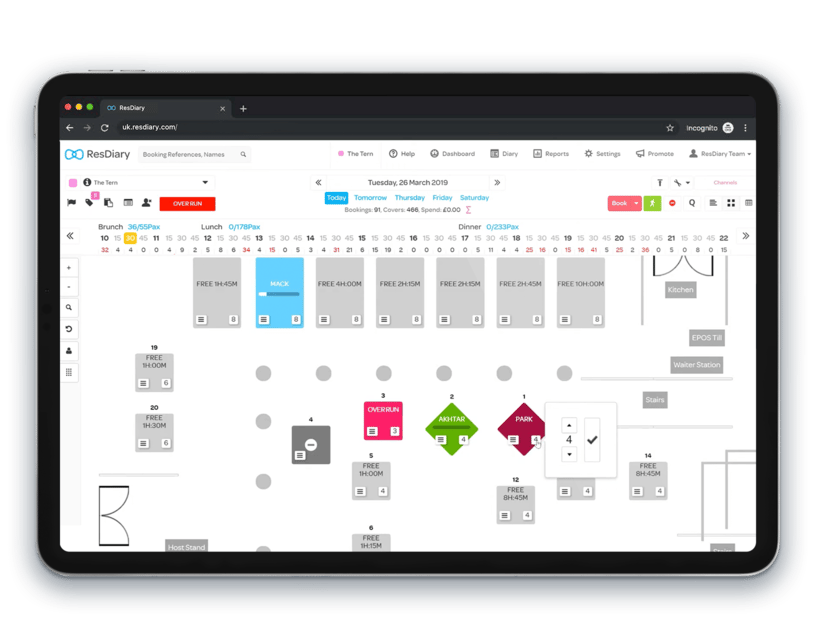
Pricing
ResDiary offers four pricing plans:
- Connect: €99/month
- Express: €129/month
- Pro: €189/month
- Ultimate: €289/month
Advantages of ResDiary
- User-friendly: ResDiary is easy to use for both restaurant staff and guests.
- Comprehensive reservation and table management: ResDiary offers a variety of features to help restaurants manage their reservations and tables, including online booking, waitlists, and table notifications.
- Channel management: ResDiary's channel management capabilities allow restaurants to connect with various online booking platforms and increase their visibility across different channels.
- Customizable messaging and communication tools: ResDiary offers customizable messaging and communication tools that restaurants can use to stay in touch with guests and send them important updates.
- Reporting and analytics: ResDiary's reporting and analytics features can help restaurants make data-driven decisions to enhance guest satisfaction and revenue.
Disadvantages of ResDiary
- Can be expensive: ResDiary's pricing is in line with other premium reservation and guest management platforms, but it can be expensive for smaller restaurants on a tight budget.
- Some users have reported that the system can be complex and difficult to use: ResDiary offers a variety of features, which makes it a powerful tool, but it can also make it complex and difficult to use, especially for new users.
- Customer support has been criticized by some users: Some ResDiary users have reported that the company's customer support is not responsive or helpful.
Overall
ResDiary is a powerful and user-friendly reservation and table management system with unique channel management capabilities. However, it is important to be aware of the potential disadvantages before making a decision.
If you are a restaurant owner or manager, I recommend that you compare ResDiary to other reservation and table management systems before making a decision. Consider your specific needs and budget when making your decision.
Tableo
Tableo is a cloud-based table management system that helps restaurants of all sizes to get organized, save time, automate bookings, turn more tables, collect payments, and reduce no-shows.
It offers a comprehensive set of features, including:
- Reservation management
- Table management
- Online booking integration
- Diner discovery
- Shift planning
- Guest history and details
- Reservation and table turnover reports
- Guest preference recording and sharing
Tableo is easy to use and affordable, making it a good option for small to medium-sized restaurants.
%20(1).webp?width=800&height=607&name=Digital-Diary-for-Restaurants%20(3)%20(1).webp)
Pricing
- Free plan for up to 100 bookings per month
- Paid plans start at $99 per month for 300 bookings per month
Advantages of Tableo
- Easy to use
- Comprehensive features, including reservation management, table management, online booking integration, diner discovery, shift planning, guest history and details, reservation and table turnover reports, and guest preference recording and sharing
- Affordable pricing
Disadvantages of Tableo
- The mobile interface can be better
- Some bugs in the system and widget
- Sometimes when customers use debit cards, you cannot charge a no-show fee
- You will only get notified of a canceled booking by email, which is not always accessible during working hours
Overall
Tableo is a good overall table management system, especially for small to medium-sized restaurants. It is easy to use and has a comprehensive set of features at an affordable price. However, there are some minor cons, such as the mobile interface and the bugs.
Quandoo
Quandoo is a popular online restaurant reservation platform that offers a number of advantages to restaurants, such as global reach, convenience, and features tailored to the restaurant industry.
.webp?width=800&height=452&name=3%20availablity%20(2).webp)
Advantages of Quandoo
- Global reach: Quandoo is available in 12 countries, so it can help restaurants attract diners from all over the world.
- Convenient and easy to use: Customers can book tables online, through the Quandoo app, or through integrations with other channels such as Apple, Facebook, Google Maps, Instagram, and WeChat.
- Features tailored to the restaurant industry: Quandoo offers a number of features that are specifically designed for restaurants, such as table and waitlist management, guest CRM, and integrations with other tools.
- Reliable: Quandoo has a good reputation for reliability and customer service.
- Affordable: Quandoo's commission rate is lower than some of its competitors.
Disadvantages of Quandoo
- Some restaurants have reported that Quandoo can be difficult to integrate with their existing systems.
- Quandoo has been criticized for its fees, which can be high for some restaurants.
- Some restaurants have also reported that Quandoo can be difficult to use and navigate.
Overall
Quandoo is a good choice for restaurants that are looking for a global online restaurant reservation platform that is easy to use and offers a number of features that are tailored to the restaurant industry.
However, restaurants should carefully consider the fees and integration requirements before choosing Quandoo.
Takeaways
Restaurant reservation systems come in all shapes and sizes, meeting the needs and budgets of every restaurant.
This roundup of the best online restaurant reservation systems should help you find one that fits your budget and has the features you need.
While these systems may seem costly at first glance, they offer much more value than meets the eye.
By organizing and streamlining your internal operations and creating memorable customer experiences, the right reservation system can pay for itself and more.














%20(1).webp?width=200&name=Eat%20(15)%20(1).webp)

-1.png?width=1812&height=1072&name=TripAdvisor%20%26%20More%20Bookings%20(1)-1.png)
-2.png?width=1812&height=1072&name=Google%20Bookings%20(1)-2.png)

-1.jpg?width=200&name=pexels-tidos-mes-3134448-21063847%20(1)-1.jpg)
-1.png?width=200&name=TripAdvisor%20%26%20More%20Bookings%20(1)-1.png)
-2.png?width=200&name=Google%20Bookings%20(1)-2.png)
-1.png?width=200&name=Instagram%20Bookings%20(1)-1.png)
-1-png.webp?width=200&name=Facebook%20Integration%20Rectangle%20(1)-1-png.webp)







.webp?width=200&name=download%20(1).webp)
%20(1)-2.webp?width=200&name=Eat%20(34)%20(1)-2.webp)
%20(1)-2.webp?width=200&name=Eat%20(18)%20(1)-2.webp)





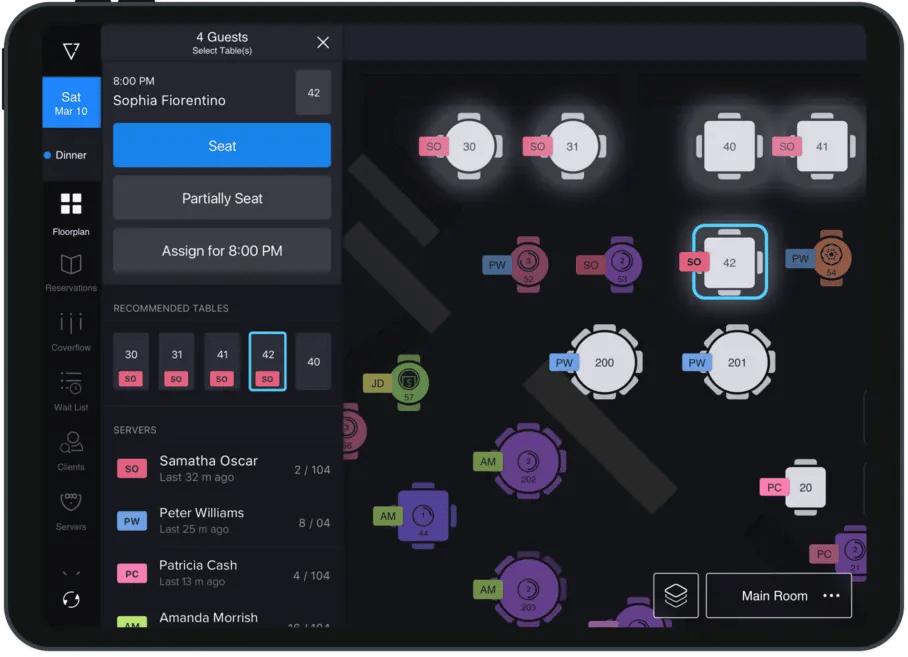
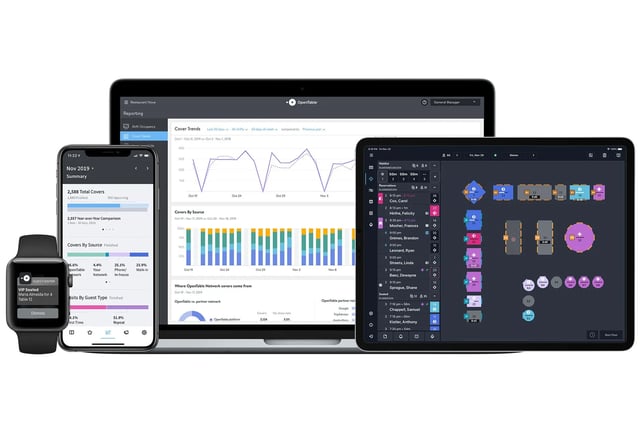






.webp?width=144&height=72&name=Eat%20App%20Logo%20(3).webp)